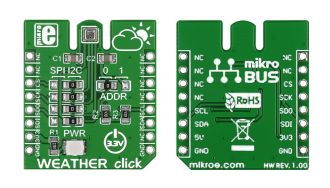
We strongly encourage users to use Package manager for sharing their code on Libstock website, because it boosts your efficiency and leaves the end user with no room for error. [more info]

Rating:
Author: MIKROE
Last Updated: 2019-03-20
Package Version: 1.0.0.1
mikroSDK Library: 1.0.0.0
Category: Environmental
Downloaded: 8413 times
Followed by: 3 users
License: MIT license
Weather click carries the BME280 integrated environmental unit from Bosch. It’s a sensor that detects humidity, pressure and temperature.Weather click can communicate with the target MCU either through mikroBUS SPI or I2C interfaces. The board is designed to use a 3.3V power supply.
Do you want to subscribe in order to receive notifications regarding "Weather click" changes.
Do you want to unsubscribe in order to stop receiving notifications regarding "Weather click" changes.
Do you want to report abuse regarding "Weather click".

Library Description
The library covers all the necessary functions to control Weather Click board. Library performs the communication with the device via I2C or SPI driver by writing to registers and by reading from registers. The library has generic write and reads function, get measurements function, get temperature, humidity and pressure data from the register, the function for reading factory calibration, for sets configuration, etc. Function who gets temperature, humidity and pressure also read factory calibration and converts temperature data to degree Celsius [ °C ], humidity value to a percentage [ % ] and pressure value to mbar.
Key functions:
Examples description
The application is composed of three sections:
void applicationTask()
{
weather_getWeather( &temperature, &humidity, &pressure );
FloatToStr( temperature, logText );
mikrobus_logWrite( " Temperature : ", _LOG_TEXT );
mikrobus_logWrite( logText, _LOG_TEXT );
mikrobus_logWrite( degCel, _LOG_LINE );
FloatToStr( humidity, logText );
mikrobus_logWrite( " Humidity : ", _LOG_TEXT );
mikrobus_logWrite( logText, _LOG_TEXT );
mikrobus_logWrite( " %", _LOG_LINE );
FloatToStr( pressure, logText );
mikrobus_logWrite( " Pressure : ", _LOG_TEXT );
mikrobus_logWrite( logText, _LOG_TEXT );
mikrobus_logWrite( " mbar", _LOG_LINE );
mikrobus_logWrite( "-----------------------------", _LOG_LINE );
Delay_ms( 3000 );
}
Other mikroE Libraries used in the example:
SPI or I2CUART​ConversionAdditional notes and informations
Depending on the development board you are using, you may need USB UART click, USB UART 2 click or RS232 click to connect to your PC, for development systems with no UART to USB interface available on the board. The terminal available in all MikroElektronika compilers, or any other terminal application of your choice, can be used to read the message